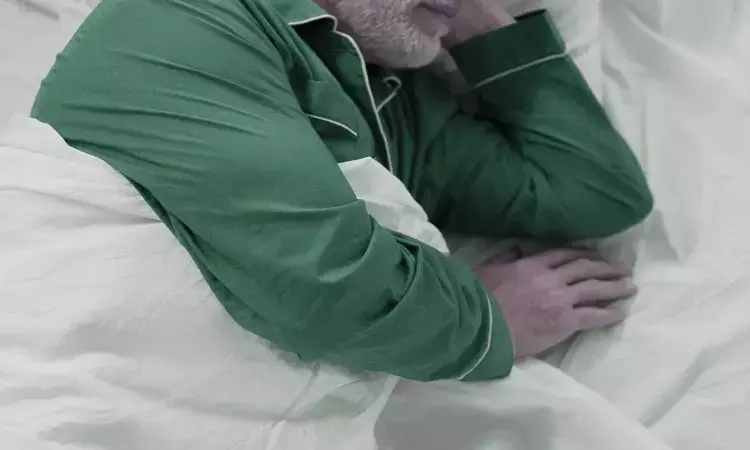- Home
- Medical news & Guidelines
- Anesthesiology
- Cardiology and CTVS
- Critical Care
- Dentistry
- Dermatology
- Diabetes and Endocrinology
- ENT
- Gastroenterology
- Medicine
- Nephrology
- Neurology
- Obstretics-Gynaecology
- Oncology
- Ophthalmology
- Orthopaedics
- Pediatrics-Neonatology
- Psychiatry
- Pulmonology
- Radiology
- Surgery
- Urology
- Laboratory Medicine
- Diet
- Nursing
- Paramedical
- Physiotherapy
- Health news
- Fact Check
- Bone Health Fact Check
- Brain Health Fact Check
- Cancer Related Fact Check
- Child Care Fact Check
- Dental and oral health fact check
- Diabetes and metabolic health fact check
- Diet and Nutrition Fact Check
- Eye and ENT Care Fact Check
- Fitness fact check
- Gut health fact check
- Heart health fact check
- Kidney health fact check
- Medical education fact check
- Men's health fact check
- Respiratory fact check
- Skin and hair care fact check
- Vaccine and Immunization fact check
- Women's health fact check
- AYUSH
- State News
- Andaman and Nicobar Islands
- Andhra Pradesh
- Arunachal Pradesh
- Assam
- Bihar
- Chandigarh
- Chattisgarh
- Dadra and Nagar Haveli
- Daman and Diu
- Delhi
- Goa
- Gujarat
- Haryana
- Himachal Pradesh
- Jammu & Kashmir
- Jharkhand
- Karnataka
- Kerala
- Ladakh
- Lakshadweep
- Madhya Pradesh
- Maharashtra
- Manipur
- Meghalaya
- Mizoram
- Nagaland
- Odisha
- Puducherry
- Punjab
- Rajasthan
- Sikkim
- Tamil Nadu
- Telangana
- Tripura
- Uttar Pradesh
- Uttrakhand
- West Bengal
- Medical Education
- Industry
Hypersomnolence among elderly may increase risk for diabetes, cancer, and high BP

A new study links daytime sleepiness in the elderly to increased risk of developing diabetes, cancer, and high BP.
MINNEAPOLIS - Hypersomnolence is defined as excessive daytime sleepiness even after having seven or more hours of sleep. It can be debilitating for some people, affecting the way that they perform at work and in other daily activities.
Older people who experience daytime sleepiness may be at risk of developing new medical conditions, including diabetes, cancer, and high blood pressure, according to a preliminary study released today that will be presented at the American Academy of Neurology's 72nd Annual Meeting in Toronto, Canada, April 25 to May 1, 2020.
"Paying attention to sleepiness in older adults could help doctors predict and prevent future medical conditions," said study author Maurice M. Ohayon, M.D., Ph.D., DSc, of Stanford University in Stanford, Calif., and a member of the American Academy of Neurology. "Older adults and their family members may want to take a closer look at sleeping habits to understand the potential risk for developing a more serious medical condition."
The study involved 10,930 people; 34% of participants were 65 years or older.
Researchers interviewed participants over the phone two times, three years apart. In the first interview, 23% of people over 65 met the criteria for excessive sleepiness. In the second interview, 24% reported excessive sleepiness. Of those, 41% said the sleepiness was a chronic problem.
The study found that people who reported sleepiness in the first phone interview had a 2.3 times greater risk of developing diabetes or high blood pressure three years later than those who did not experience sleepiness. They were also twice as likely to develop cancer. Of the 840 people who reported sleepiness at the first interview, 52 people, or 6.2%, developed diabetes compared to 74 people, or 2.9% of those who were never sleepy during the day. Also, of the 840 people who reported sleepiness, 20 people, or 2.4%, developed cancer compared to 21 people, or 0.8% of those who were never sleepy during the day.
The results remained the same after researchers adjusted for other factors that could affect daytime sleepiness, such as gender and sleep apnea.
People who reported daytime sleepiness during both interviews had a 2.5 times greater risk of developing heart disease.
People who reported sleepiness only in the second interview were 50% more likely to also have diseases of the musculoskeletal system and connective tissue, such as arthritis, tendinitis, and lupus, than those who did not have daytime sleepiness.
A limitation of the study was that it relied on participants' memories, rather than monitoring their sleep length and quality and daytime sleepiness in a sleep clinic.
for further references log on to:
American Academy of Neurology
Dr Kamal Kant Kohli-MBBS, DTCD- a chest specialist with more than 30 years of practice and a flair for writing clinical articles, Dr Kamal Kant Kohli joined Medical Dialogues as a Chief Editor of Medical News. Besides writing articles, as an editor, he proofreads and verifies all the medical content published on Medical Dialogues including those coming from journals, studies,medical conferences,guidelines etc. Email: drkohli@medicaldialogues.in. Contact no. 011-43720751


